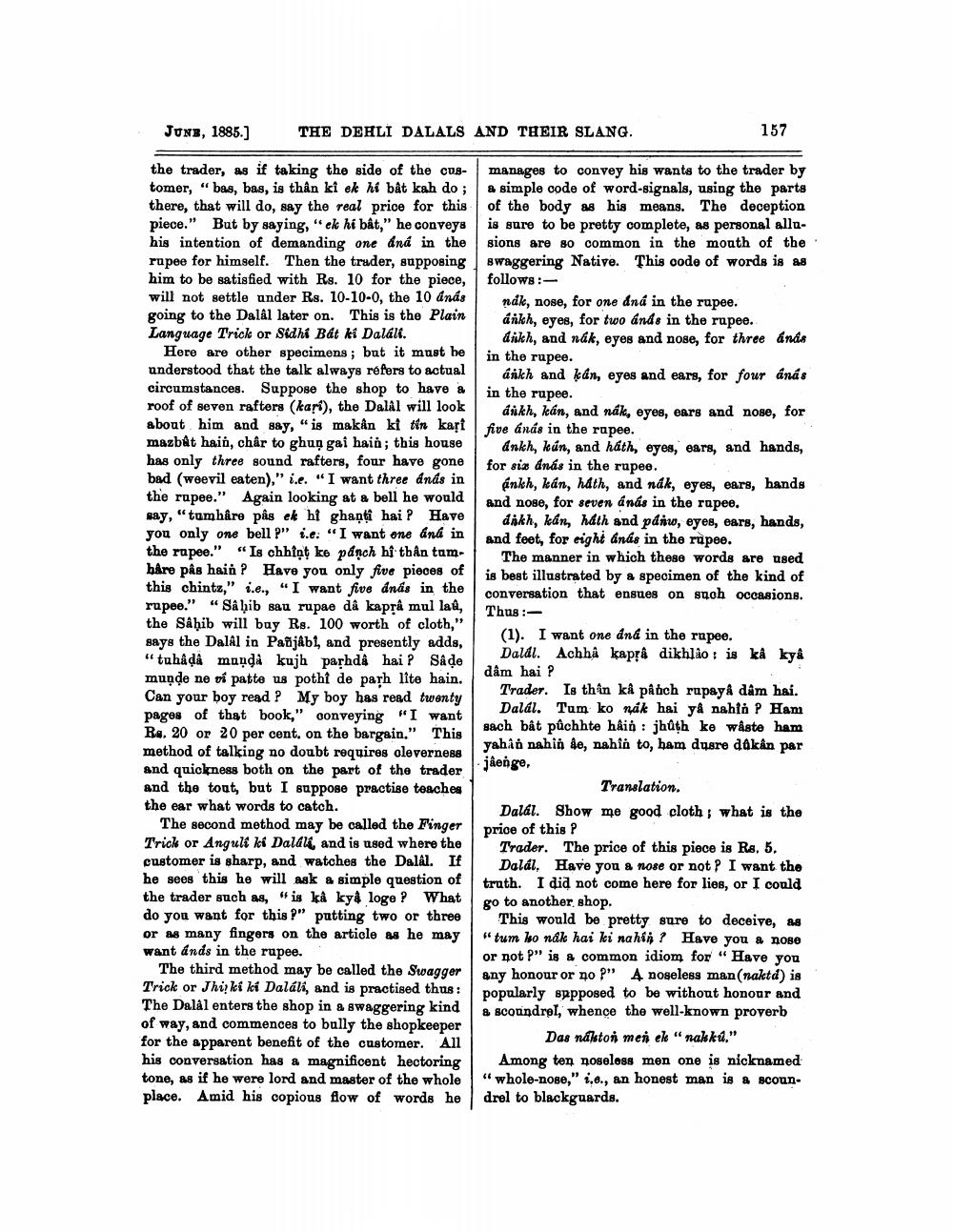________________
JUNE, 1885.]
THE DEHLI DALALS AND THEIR SLANG.
157
the trader, as if taking the side of the customer,"bas, bas, is thần ki ek hi båt kah do ; there, that will do, say the real price for this piece." But by saying, " ek hi bât," he conveye his intention of demanding one aná in the rupee for himself. Then the trader, supposing him to be satisfied with Rs. 10 for the piece, will not settle ander Rs. 10-10-0, the 10 dnás going to the Dalal later on. This is the plain Language Trick or Sidhi Bát ki Dalált.
Here are other specimens; but it must be understood that the talk always refers to actual circumstances. Suppose the shop to have a
the shop to have & roof of seven rafters (kari), the Dalal will look about him and say, "is makin ki tin kari mazbat hain, chår to ghuị gai hair; this house has only three sound rafters, four have gone bad (weevil eaten)," i.e. "I want three ands in the rupee." Again looking at a bell he would say, "tumhare pås ek hf ghanti hai ? Have you only one bell P" i.e: "I want one and in the rapee." "Is chhint ke pánch hi thân tamhåre pas hain ? Have you only five pieces of this chintz," i.e., “I want five dnds in the rupee." "Sahib sau rupae då kaprâ mul lat, the Sahib will buy Rs. 100 worth of cloth," says the Dalal in Panjabi, and presently adds, "tuhada manda kujh pashda hai ? Så de munde ne vi patte us pothî de parh lite hain. Can your boy read ? My boy has read twenty pages of that book," conveying "I want Re. 20 or 20 per cent. on the bargain." This method of talking no doubt requires cleverness and quickness both on the part of the trader and the tout, but I suppose practise teaches the ear what words to catch. The second method may be called the Finger
called the finger Trick or Angult ki Dalálk, and is used where the customer is sharp, and watches the Dalal. If he sees this he will ask a simple question of the trader such as, "is kâ ky4 loge? What do you want for this?" putting two or three or as many fingers on the article es he may want ands in the rupee.
The third method may be called the Swagger Trick or Jhiki ki Daláli, and is practised thus : The Dalal enters the shop in a swaggering kind of way, and commences to bully the shopkeeper for the apparent benefit of the customer. All his conversation has a magnificent hectoring tone, as if he were lord and master of the whole place. Amid his copious flow of words he
manages to convey his wants to the trader by a simple code of word-signals, using the parts of the body as his means. The deception is sure to be pretty complete, as personal allusions are so common in the mouth of the swaggering Native. This code of words is as follows:
ndk, nose, for one dná in the rupee. ankh, eyes, for two ands in the rupee.
dikh, and nák, eyes and nose, for three andis in the rupee.
aikh and ķán, eyes and ears, for four ands in the rupee.
dikh, kán, and nák, eyes, ears and nose, for five ands in the ropee.
Ankh, lo ún, and háth, eyes, ears, and hands, for six anás in the rupee.
ankh, kán, háth, and nák, eyes, ears, hands and nose, for seven á nás in the rupee.
dikh, kán, hath and pdiw, eyes, ears, hands, and feet, for cighi ánás in the rupee.
The manner in which these words are used is best illustrated by a specimen of the kind of conversation that ensues on suoh occasions. Thus:--
(1). I want one dna in the rupee.
Daldl. Achhå kapra dikhlio: is kå kya dâm hại ?
Trader. Is thin kå påóch rupaya dam hai.
Daldi. Tum ko nak hai ya nahli P Ham gach bât pûchhte hâio : jhuth ke wåste ham yahan nahin de, nahin to, ham dusre dakan par jaenge,
Translation. Dalal. Show me good cloth; what is the prioe of this ?
Trader. The price of this piece is Rs. 5.
Daldi. Have you a nose or not P I want the truth. I did not come here for lies, or I could go to another shop.
This would be pretty sure to deceive, as " tum ho ndk hai ki nahin ? Have you a nose or not P" is a common idiom for "Have you any honour or no p" 4 noseless man(naktd) is popularly supposed to be without honour and & scoundrol, whence the well-known proverb
Das náston men ek "nakku." Among ten noselose men one is nicknamed "whole-nose," 1.6., an honest man is a scoundrel to blackguards.




